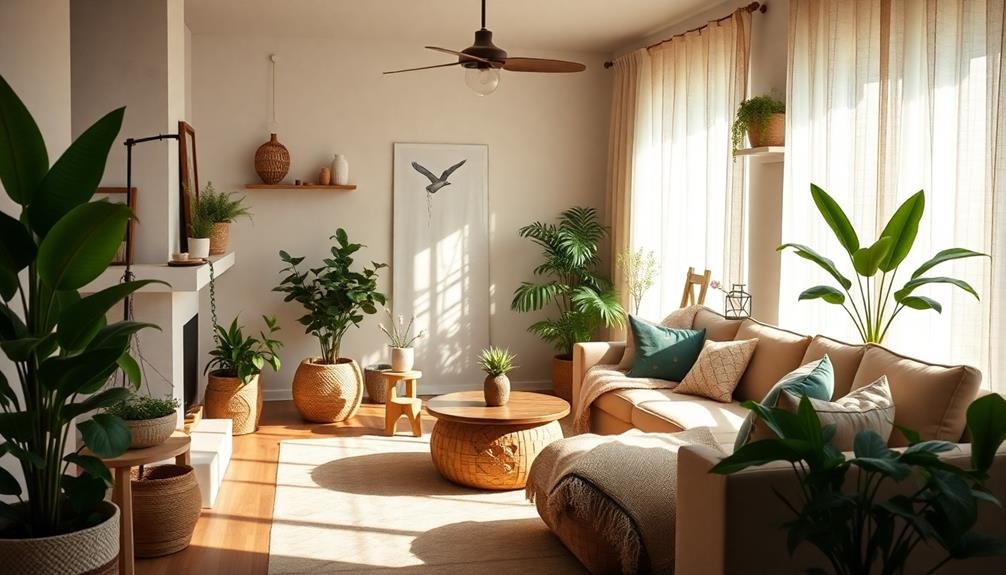Revitalizing your home with eco-friendly swaps is easier than you might think. Start by replacing plastic toothbrushes with bamboo ones, which are biodegradable and stylish. Switch single-use plastic bags for durable, reusable grocery bags, and improve your indoor air with natural cleaning products like vinegar and baking soda. Opt for energy-efficient light bulbs to save electricity while brightening your space. Choose recycled paper products for hygiene essentials, and consider sustainable furniture made from reclaimed materials. Finally, use low-VOC paint for a healthier atmosphere and set up a compost bin to reduce waste. Keep exploring; there's so much more you can do!
Bamboo Toothbrushes
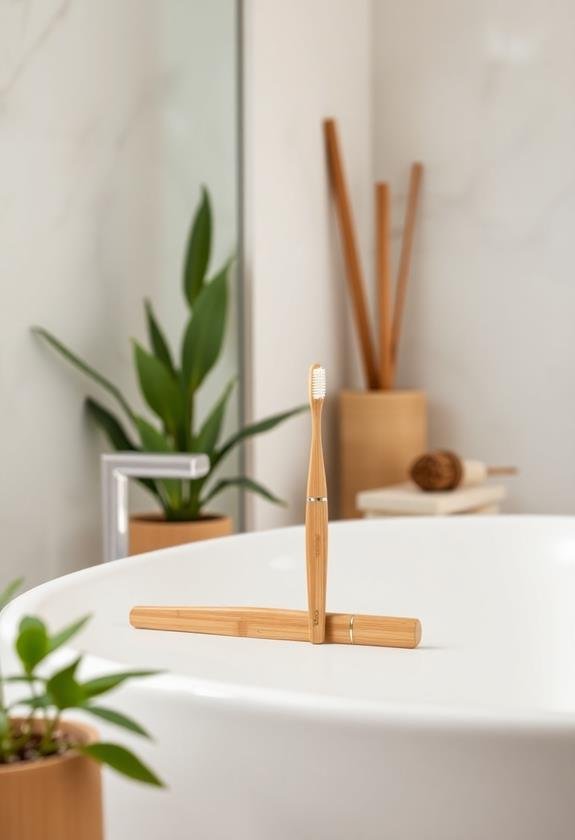
As you make eco-friendly choices for your home, consider swapping out your plastic toothbrush for a bamboo one. Bamboo toothbrushes are not only biodegradable but also a sustainable alternative to their plastic counterparts, which can take hundreds of years to decompose. When you choose bamboo, you're supporting a product made from natural materials that are renewable and environmentally friendly.
The soft bristles of bamboo toothbrushes are often made from nylon-6, which is more eco-conscious than traditional plastics. Many brands offer options with compostable bristles, making your oral care routine even greener. It's easy to find these brushes in various sizes and bristle stiffness, catering to different preferences and needs.
Switching to a bamboo toothbrush can also enhance your daily routine. Imagine brushing your teeth with a product that feels good in your hand while contributing to environmental conservation. As an added bonus, many bamboo toothbrushes come in sustainable packaging, reducing waste even further.
Reusable Grocery Bags
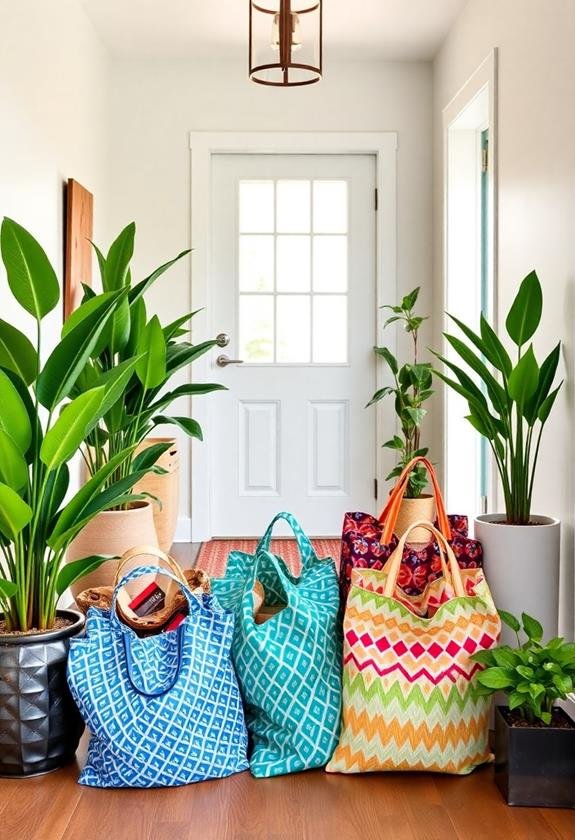
Making the switch to reusable grocery bags is a simple yet impactful way to reduce plastic waste in your daily life. Every time you choose a reusable bag over single-use plastic, you're making a conscious decision to protect the environment. These bags are typically made from durable materials, which means they can carry more weight and last longer than their plastic counterparts. By opting for eco-friendly storage solutions, you not only benefit your shopping routine but also contribute to a sustainable lifestyle.
When shopping, keep your reusable bags in your car or by the front door, so you won't forget them. You might even consider choosing bags with fun designs that reflect your personality, making them not only practical but also stylish. Many stores offer incentives for using reusable bags, such as discounts or reward points, which can make the switch even more appealing.
Additionally, remember to wash your reusable bags regularly to maintain hygiene, especially if you're using them for groceries. By incorporating this small change into your routine, you contribute to a larger movement toward sustainability. So, the next time you head out to shop, grab those reusable bags. You'll feel good knowing you're doing your part to reduce plastic waste and promote a healthier planet for future generations.
Natural Cleaning Products
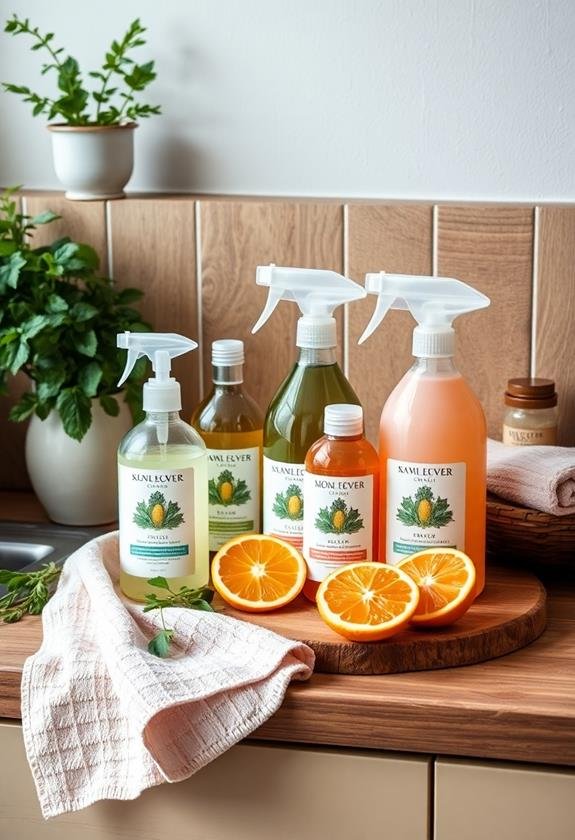
Switching to natural cleaning products is another effective way to enhance your eco-friendly lifestyle at home. These products are not only better for the environment, but they also promote a healthier indoor atmosphere for you and your family. By eliminating harsh chemicals, you reduce your exposure to toxins that can linger in your home.
Here are four natural cleaning product options to take into account:
- Vinegar: This powerhouse can disinfect surfaces, remove odors, and even dissolve mineral deposits. Mix equal parts vinegar and water in a spray bottle for an all-purpose cleaner.
- Baking Soda: A gentle abrasive, baking soda effectively scrubs away grime and can neutralize odors. Use it to clean sinks or freshen carpets.
- Lemon Juice: Its natural acidity acts as a stain remover and deodorizer. Combine lemon juice with water for a revitalizing scent while cleaning.
- Castile Soap: This vegetable-based soap is versatile for various surfaces, from dishes to floors. Just dilute it with water for a safe cleaning solution.
Energy-Efficient Light Bulbs
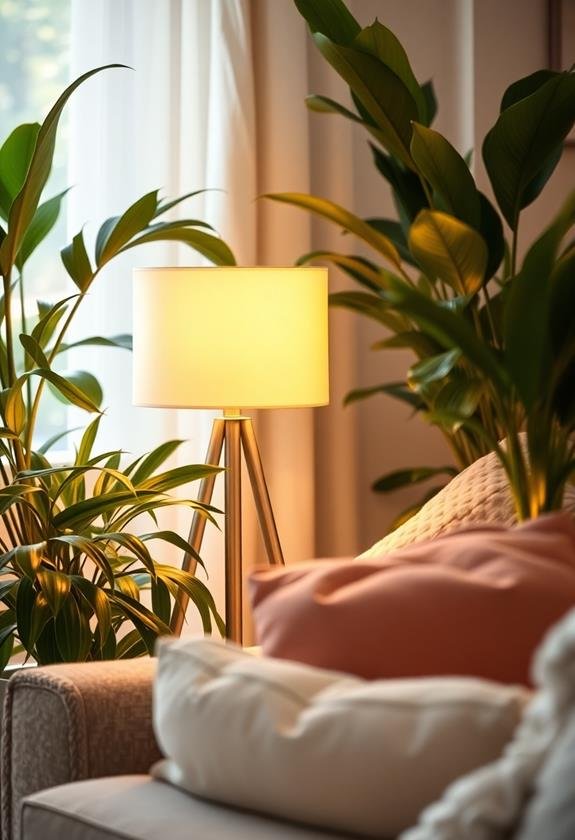
Brightening your home with energy-efficient light bulbs is a simple yet impactful way to reduce your carbon footprint. By swapping out traditional incandescent bulbs for energy-efficient options like LED or CFL bulbs, you can greatly lower your energy consumption. These bulbs use up to 80% less electricity and last much longer, often around 10 to 25 times more than their incandescent counterparts. Furthermore, incorporating sustainable lighting solutions into your home can enhance both its aesthetic and environmental appeal.
Imagine replacing just a few light bulbs in your home. You'll not only notice a decrease in your electricity bills but also contribute to reducing greenhouse gas emissions over time. For instance, if you replace a typical 60-watt incandescent bulb with a 10-watt LED, you'll save about $55 over the bulb's lifespan while using less energy.
Additionally, energy-efficient light bulbs come in various shapes and colors, allowing you to create the desired ambiance in any room. Whether you're looking for a warm glow for your living room or bright light for your kitchen, there's an option that suits your needs. So, why not make the switch? Your home will shine brighter, and you'll feel good knowing you're making a sustainable choice.
Recycled Paper Products
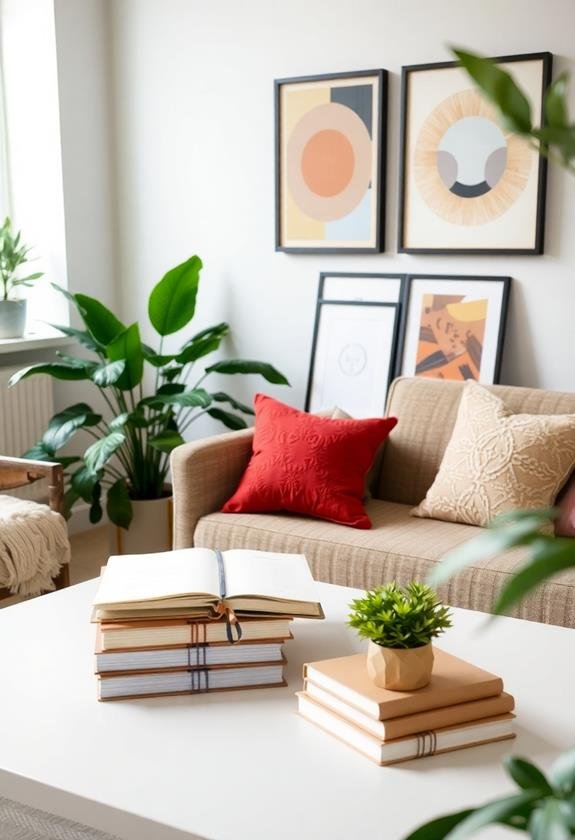
Recycled paper products offer an easy way to reduce waste and promote sustainability in your home. By choosing items made from recycled materials, you not only help conserve natural resources but also support a circular economy. It's a small change that can have a big impact on the environment.
Here are four simple swaps you can make:
- Recycled Paper Towels: Instead of traditional paper towels, opt for those made from recycled paper. They work just as well and cut down on deforestation.
- Recycled Toilet Paper: Look for brands that use recycled materials. You'll find that many options are soft and effective, proving that sustainability doesn't compromise quality.
- Recycled Notebooks: Switch to notebooks made from recycled paper for your schoolwork or notes. They're often just as durable and can inspire eco-friendly habits.
- Recycled Gift Wrap: Choose gift wrap made from recycled paper. Not only does it look great, but it also sends a message about your commitment to the environment.
Indoor Plants
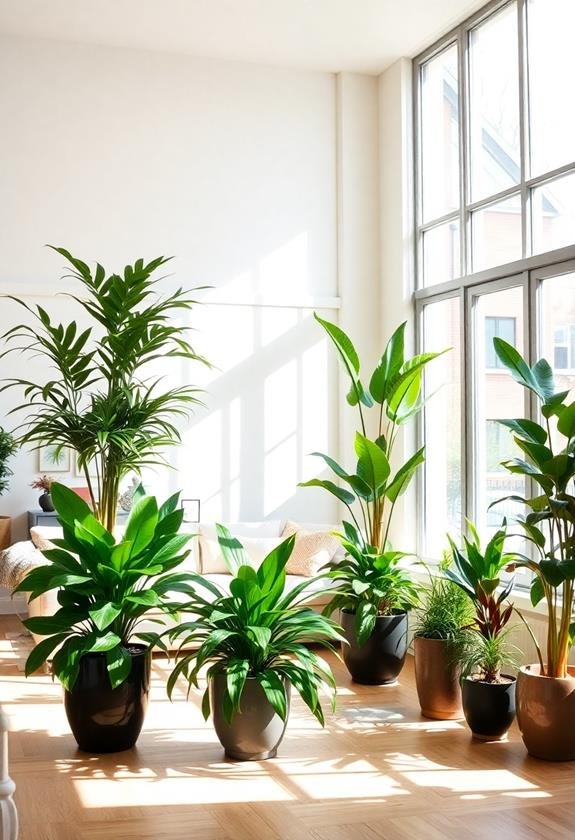
Indoor plants can transform your home into a vibrant oasis while improving air quality. Incorporating greenery not only beautifies your space but also brings numerous health benefits. Plants like spider plants, snake plants, and pothos are known for their air-purifying qualities, effectively removing harmful toxins and releasing oxygen. Top air purifiers like the Peace Lily and ZZ Plant are also excellent choices for beginners, as they require minimal maintenance and thrive in various light conditions.
When you choose indoor plants, you're also inviting nature inside, which can boost your mood and reduce stress levels. Studies have shown that being around plants can enhance productivity and creativity, making them perfect companions for your workspace or study area.
To get started, consider your space and the amount of natural light it receives. Some plants thrive in low light, while others need bright, indirect sunlight. If you're new to plant care, start with hardy varieties that require minimal maintenance. Don't forget to check the watering needs, as overwatering is a common mistake.
Adding indoor plants to your home creates a more inviting atmosphere, encourages mindfulness, and supports your well-being. So, go ahead and explore the world of indoor gardening; you'll be amazed at how a few plants can greatly enhance your living environment.
Sustainable Furniture
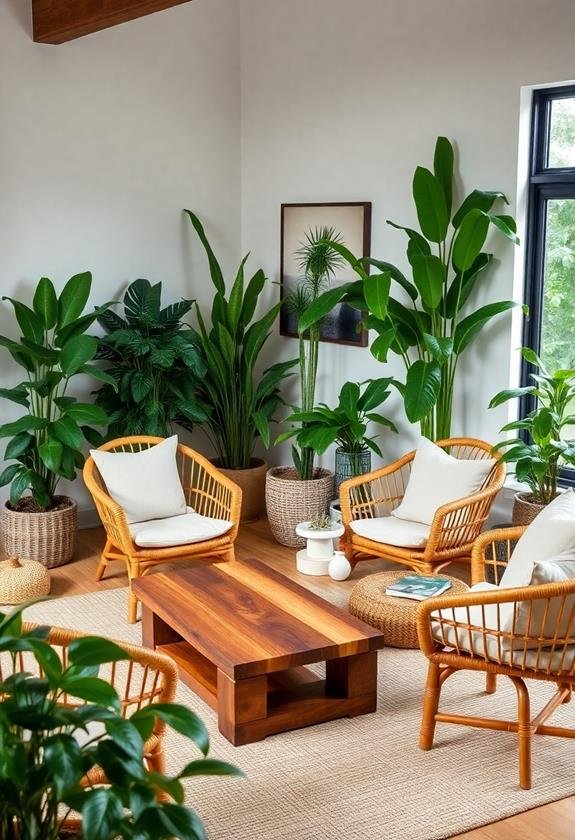
Choosing sustainable furniture not only enhances your home's aesthetic but also contributes to a healthier planet. By opting for pieces made from eco-friendly materials, you can create a stylish and environmentally responsible living space. Sustainable furniture often includes items crafted from reclaimed wood, bamboo, or recycled materials, which reduce waste and lower your carbon footprint.
Here are four tips to help you choose sustainable furniture:
- Look for Certifications: Seek furniture with certifications like FSC (Forest Stewardship Council) or Greenguard, ensuring responsible sourcing and minimal emissions.
- Choose Local Makers: Supporting local artisans reduces transportation emissions and helps bolster your community's economy.
- Consider Vintage and Second-Hand: Shopping at thrift stores or online marketplaces for pre-owned furniture not only saves money but also promotes recycling and reduces demand for new resources.
- Prioritize Durability: Invest in well-made furniture that lasts longer. High-quality pieces won't just look good; they'll save you money and resources in the long run.
Eco-Friendly Paint

When updating your living space with sustainable furniture, don't overlook the impact of the paint you choose. Eco-friendly paint options can greatly enhance the health of your home environment. Traditional paints often contain volatile organic compounds (VOCs), which can release harmful fumes and affect air quality. Instead, look for paints labeled as low-VOC or no-VOC. These alternatives provide the same vibrant colors without the toxic emissions, making them a safer choice for you and your family.
Additionally, consider using natural paints made from plant-based materials and mineral pigments. Brands like milk paint or clay paint not only offer unique finishes but are also biodegradable. They can transform your walls while being kinder to the planet. When selecting your paint, always check for certifications, such as Greenguard or EcoLogo, which indicate that the product meets strict environmental standards.
Compost Bins
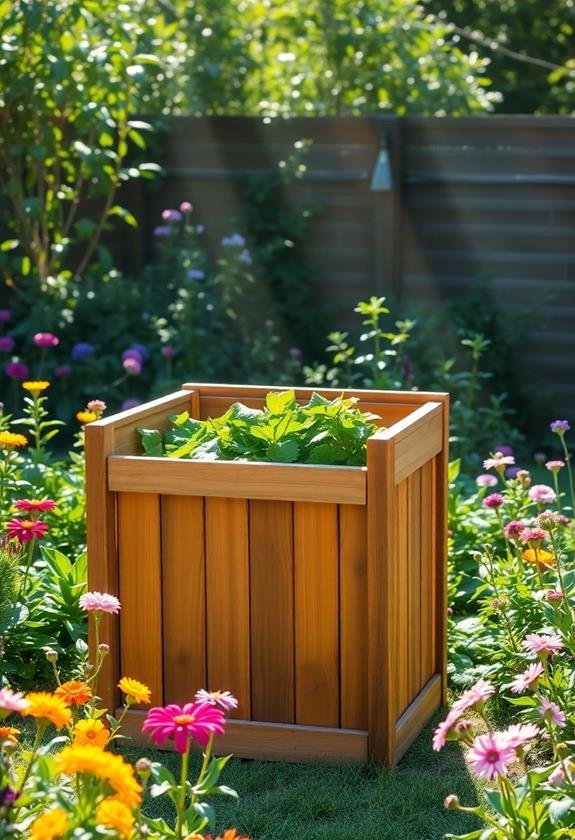
Composting is a simple yet powerful way to reduce waste and enrich your garden. By setting up a compost bin, you can turn your kitchen scraps and yard waste into nutrient-rich compost, perfect for fertilizing plants. It's not only beneficial for your garden, but it also greatly decreases the amount of waste sent to landfills.
When choosing a compost bin, consider the following options:
- Tumbler Bins: These bins rotate, making it easy to mix materials and speed up the composting process.
- Worm Composting (Vermicomposting): This method uses worms to break down organic matter, producing rich compost in a smaller space.
- Stationary Bins: Simple, sturdy bins that allow you to layer organic materials while microorganisms do the work.
- DIY Bins: You can easily create your own with pallets or wire mesh, allowing you to customize the size according to your needs.
Getting started is as easy as collecting organic waste, layering it, and letting nature take its course. With a little patience, you'll have your compost ready to boost your garden's health.
Water-Saving Fixtures
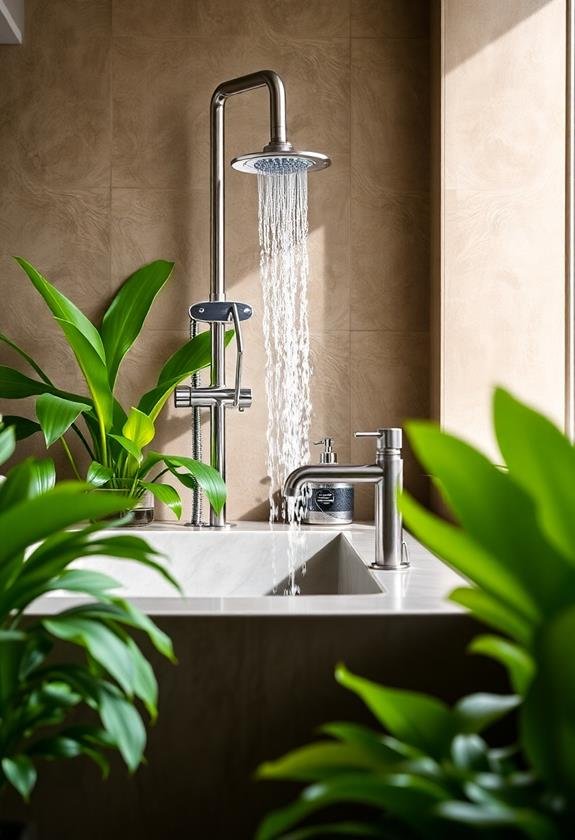
After getting your compost bin set up, you might want to look at other ways to make your home more eco-friendly. One effective step is to install water-saving fixtures. These fixtures, such as low-flow faucets, showerheads, and toilets, dramatically reduce water usage without compromising performance. By switching to low-flow faucets, you can cut your water consumption by up to 30%, which translates to significant savings on your water bill.
Consider replacing your showerhead with a model that uses less than 2.5 gallons per minute. You'll still enjoy a revitalizing shower while conserving water. Additionally, dual-flush toilets allow you to choose between a full flush or a reduced flush, making it easy to save water with every use.
You might also think about adding aerators to your faucets. These small devices mix air with water, maintaining pressure while using less water. Not only do these changes help the environment, but they also promote a sustainable lifestyle. By opting for water-saving fixtures, you're making a conscious effort to reduce your ecological footprint and contribute to a healthier planet for future generations.
Frequently Asked Questions
What Are the Benefits of Using Bamboo Over Plastic Products?
Using bamboo over plastic products offers several benefits. Bamboo's rapid growth makes it a renewable resource, reducing environmental strain. Unlike plastic, which can take centuries to decompose, bamboo naturally breaks down, minimizing waste. Additionally, bamboo's strength and durability often surpass that of plastic, making it a long-lasting choice. You'll also find bamboo products free from harmful chemicals, promoting a healthier living environment. By choosing bamboo, you're supporting sustainability and contributing to a cleaner planet.
How Can I Choose the Right Indoor Plants for My Home?
Did you know that indoor plants can improve your air quality by up to 87% within 24 hours? To choose the right ones for your home, consider factors like light availability and your maintenance preferences. For low light, try snake plants or pothos; if you want something vibrant, look into peace lilies or succulents. Assess your space and lifestyle, then select plants that not only beautify but also thrive in your environment.
Are Eco-Friendly Paints Safe for Children and Pets?
Eco-friendly paints are generally safe for children and pets, as they contain fewer volatile organic compounds (VOCs) compared to traditional paints. These lower VOC levels mean reduced exposure to harmful chemicals, making them a healthier choice for your home. However, it's still essential to check for specific certifications, like Greenguard or EcoLabel, which indicate safety standards. By choosing wisely, you can create a vibrant space without compromising your family's well-being.
How Do I Properly Compost Kitchen Waste at Home?
You might think tossing kitchen scraps in the trash is the easiest route, but composting is simpler and beneficial. Start by collecting vegetable peels, coffee grounds, and eggshells in a container. Layer these with browns like dried leaves or cardboard to balance nitrogen and carbon. Turn the pile every few weeks, keeping it moist but not soggy. In a few months, you'll have rich compost, perfect for nourishing your garden and reducing waste.
What Materials Are Sustainable When Shopping for Furniture?
When shopping for sustainable furniture, look for materials like bamboo, reclaimed wood, and recycled metal. These options not only reduce environmental impact but also offer unique aesthetics. Avoid products made from unsustainable sources, like virgin hardwood or certain plastics. Additionally, consider furniture certified by organizations like the Forest Stewardship Council (FSC). By choosing responsibly sourced materials, you support eco-friendly practices and contribute to a healthier planet, making your home both stylish and sustainable.

